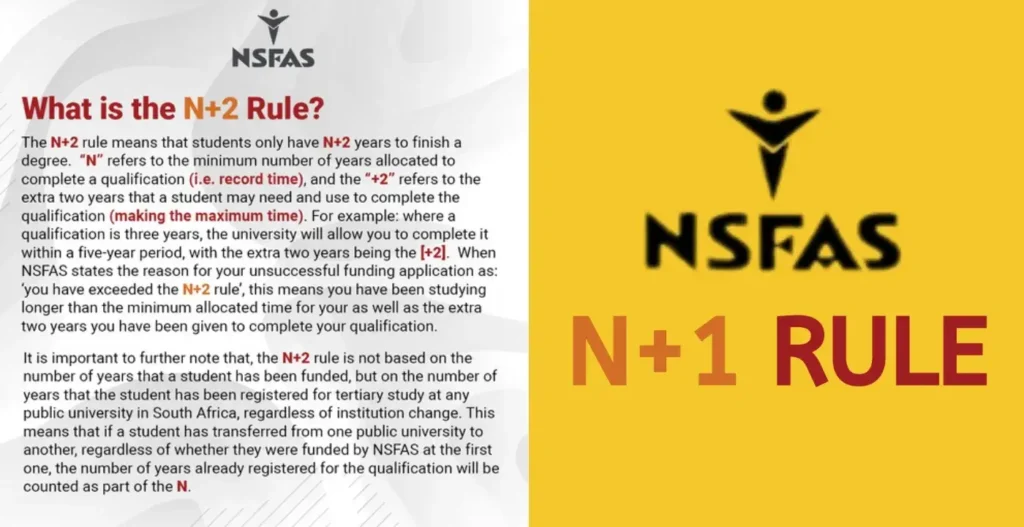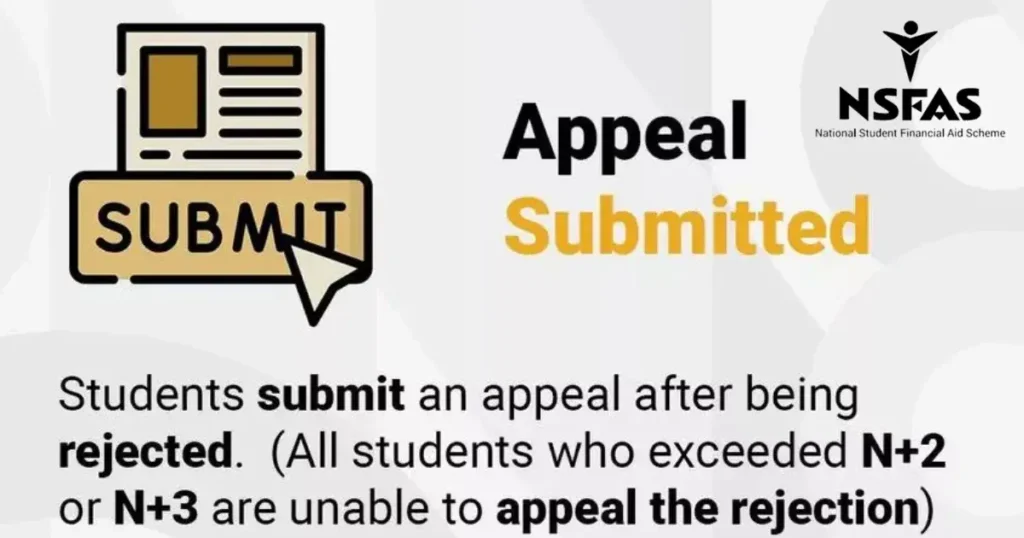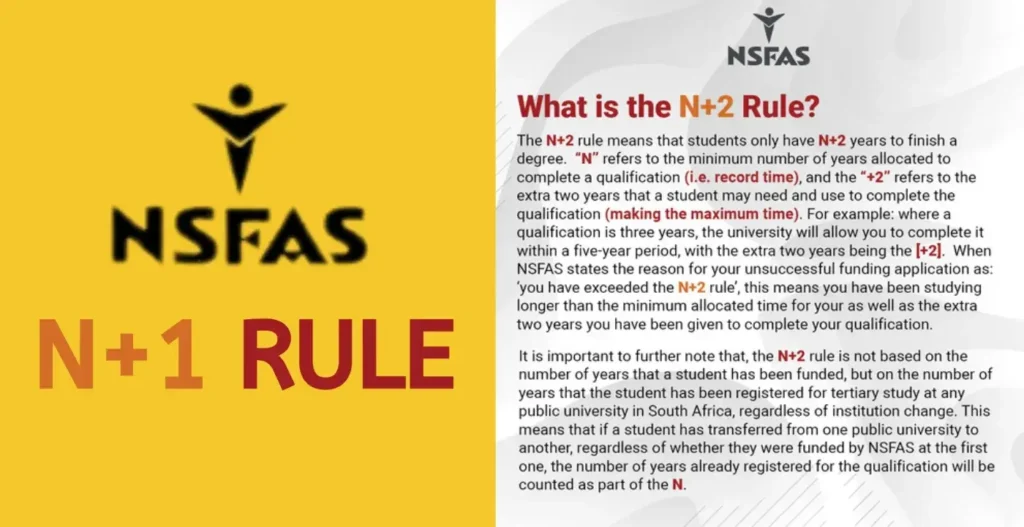The National Student Financial Aid Scheme (NSFAS) provides vital financial assistance to students from economically disadvantaged backgrounds in South Africa. By removing financial obstacles, this program enables access to higher education for those who might otherwise be unable to afford it. Among the various guidelines governing NSFAS funding, the NSFAS N+2 Rule stands as particularly significant for recipients, as it determines the maximum allowable duration for financial support.
Table of Contents
What Does the N+2 Rule Mean?

The N+2 rule establishes a maximum timeframe for completing a qualification with NSFAS funding. Here, “N” represents the standard minimum duration of a program (for example, 3 years for a typical bachelor’s degree), while “+2” indicates the additional time allowance beyond this minimum.
For instance, if you’re enrolled in a three-year degree program, NSFAS may fund your studies for up to five years total (3+2). Once this maximum period elapses, funding support terminates.
Importantly, the N+2 calculation considers a student’s entire registration history at any South African public university over the past two years, regardless of whether they’ve transferred between institutions. The rule focuses on total time spent in higher education rather than specific funding periods with NSFAS.
When NSFAS rejects an application citing the N+2 rule, it indicates that the applicant has exceeded the maximum allowable timeframe for their qualification—both the standard duration and the two-year grace period.
NSFAS maintains this policy to ensure fair resource distribution, allowing new students to enter the system rather than concentrating funds on those who require extended periods to complete their studies.
The N2 Rule: Academic Performance Requirements

In addition to the N+2 timeframe rule, NSFAS also implements an N2 rule focused on academic performance. This guideline serves as an academic progress benchmark, requiring students to achieve minimum Grade 12 Mathematics results before receiving funding.
Consequences of Poor Academic Performance
The academic performance component has significant implications. Students who fail 50% or more of their first-year modules risk losing NSFAS funding for their second year. This financial support loss often leads to program discontinuation due to financial constraints.
Furthermore, first-year academic struggles frequently predict continued challenges in subsequent years. Therefore, adhering to academic performance requirements is crucial for maintaining funding eligibility.
Strategies for Meeting Academic Requirements
To maintain NSFAS support, students should:
- Attend all classes consistently and maintain comprehensive notes
- Establish effective study routines and prioritize academic responsibilities
- Utilize available academic support resources (advisors, tutors, professors)
- Review course materials regularly rather than cramming before exams
- Participate in collaborative study groups with classmates
Funding Impact of the N2 Rule
Academic performance directly affects funding allocation. Students meeting the N2 mathematics requirement typically receive comprehensive funding covering tuition, accommodation, and essential expenses. Those falling short may still qualify for partial support.
Optimizing Your NSFAS Application
- Strategic Preparation: Dedicate sufficient time to mathematics preparation in Grade 12
- Early Submission: Complete your application well before deadlines to allow time for processing
- Seek Guidance: Consult with academic advisors or NSFAS representatives about application procedures and eligibility
Clarifying Misconceptions

Contrary to some beliefs, the N2 rule isn’t designed to exclude students but rather to establish a foundation of mathematical competency needed for higher education success.
NSFAS Evolution
The financial aid landscape continues developing alongside changing educational needs. As higher education demand grows, equitable access programs become increasingly essential.
Benefits of Meeting Requirements
Students satisfying the N2 rule develop fundamental mathematical understanding that enhances problem-solving capabilities and critical thinking—skills directly contributing to academic achievement.
Limitations and Criticism
While promoting academic readiness, the N2 requirement may exclude students with strengths in non-mathematical disciplines.
Documented Success Stories
Many students have benefited from NSFAS N2 provisions, gaining access to quality education that would have otherwise remained unattainable. These successes demonstrate the program’s positive impact on individuals and broader society.
Financial Literacy Development
Beyond immediate educational funding, NSFAS encourages responsible financial management and literacy skills.
Alternative Funding Pathways
If you don’t meet N2 requirements, consider other financial support options including scholarships, bursaries, and part-time employment alongside studies.
Post-Graduation Obligations
Upon completing your studies and entering employment, NSFAS loan repayment begins. Understanding your obligations and payment options facilitates a smooth transition to working life.
Frequently Asked Questions
What exactly is the NSFAS N2 rule?
It’s a requirement for students to achieve a minimum Grade 12 Mathematics result at the N2 level or higher to qualify for full financial aid.
Can I apply for NSFAS without meeting the N2 requirement?
Yes, applications remain possible, but meeting N2 standards significantly improves chances for comprehensive funding.
Are there additional NSFAS eligibility factors?
Yes, financial need assessment and overall academic performance are evaluated alongside the N2 requirement.
How can I improve my Grade 12 Mathematics preparation?
Consider supplementary tutoring and additional study resources to strengthen mathematical proficiency.
What if I cannot immediately repay my NSFAS loan after graduation?
NSFAS offers flexible repayment plans, including income-based options to help graduates manage their obligations effectively.
Conclusion
The NSFAS N2 rule provides educational opportunities to thousands of South African students annually. By maintaining basic mathematical proficiency standards, it equips learners with skills necessary for academic and career success. Rather than viewing the N2 rule as an obstacle, consider it a foundation for achieving your educational aspirations.

